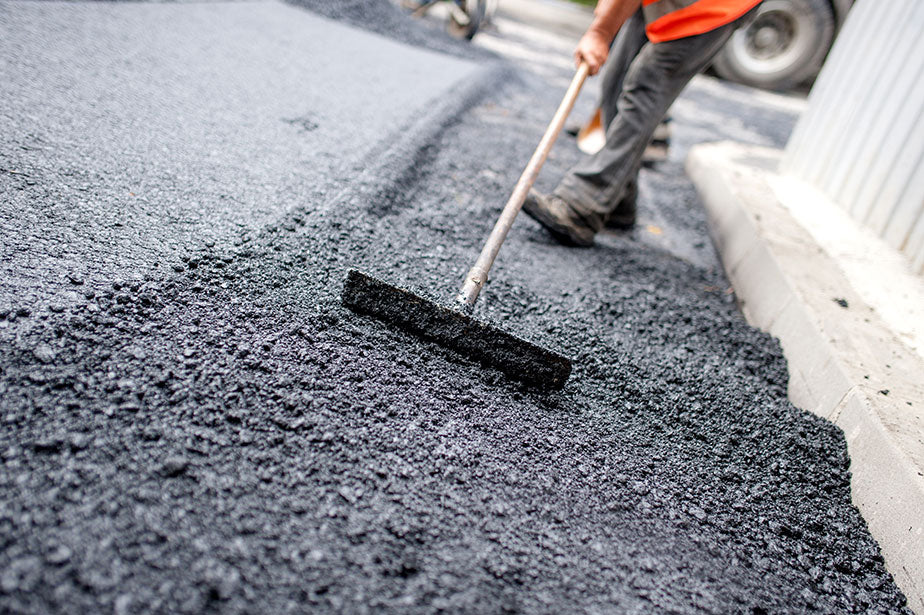Revamp Your Property's Appeal: Hot Mix Asphalt Paving for Regrading Projects
Discovering the Environmental Benefits of Warm Mix Asphalt
The application of Warm Mix Asphalt in framework jobs offers an engaging situation for sustainable growth and ecological stewardship. By diving into the elaborate information of its manufacturing procedures and the cutting-edge use recycled materials, a deeper understanding arises of how this modern technology goes past mere surface area applications. The environmental advantages of Hot Mix Asphalt prolong far beyond initial impacts, using a nuanced perspective on just how this product can pave the means for a greener future.

Decreased Greenhouse Gas Emissions
Warm Mix Asphalt production provides a considerable decrease in greenhouse gas discharges compared to other pavement products. The manufacturing procedure of Warm Mix Asphalt includes warming the mixture of aggregate and asphalt binder to high temperature levels. This procedure calls for much less power contrasted to the manufacturing of alternate sidewalk products, causing reduced greenhouse gas exhausts. In addition, the use of recycled products in Hot Mix Asphalt further adds to decreasing its environmental impact. By including reclaimed asphalt pavement and recycled asphalt shingles into the mix, the need for virgin products is minimized, causing energy financial savings and lowered exhausts related to removal and processing.
Studies have actually shown that Hot Mix Asphalt sidewalks have a smaller sized carbon footprint over their life process compared to various other sidewalk options. The toughness and recyclability of Hot Mix Asphalt further boost its environmental benefits by minimizing the need for frequent upkeep or replacement, therefore saving resources and decreasing exhausts related to reconstruction tasks.
Energy Performance and Conservation
The manufacturing procedure of Hot Mix Asphalt not just minimizes greenhouse gas emissions yet additionally adds significantly to energy performance and conservation initiatives. Energy effectiveness is an essential benefit of Warm Mix Asphalt production contrasted to various other pavement types. The procedure involves heating up the products at high temperatures to develop the asphalt mix, which requires less energy than alternative methods. Additionally, the ability to reuse and recycle asphalt sidewalk further boosts power conservation. By integrating redeemed asphalt pavement (RAP) into brand-new blends, the industry saves power that would certainly have been needed to produce completely brand-new products. Furthermore, the longevity of Hot Mix Asphalt minimizes the frequency of upkeep and restoration, bring about long-term energy cost savings. This longevity reduces the energy-intensive procedures entailed in constant repairs and replacements. On The Whole, Warm Mix Asphalt sticks out as an eco-friendly alternative that prioritizes energy effectiveness and conservation throughout its lifecycle.
Sustainable Pavement Solutions

One secret facet of lasting pavement remedies is using recycled materials such as recovered asphalt pavement (RAP) and recycled asphalt roof shingles (RAS) By integrating these materials right into the asphalt mixes, the demand for virgin resources is reduced, causing lower energy intake and greenhouse gas emissions during production. In addition, the reuse of these products aids draw away waste from landfills, contributing to a more sustainable and circular economic situation.
Additionally, lasting pavement options focus on maximizing sidewalk style to enhance performance and long life. Strategies such as warm mix asphalt (WMA) and stone mastic asphalt (SMA) improve the durability and durability of pavements, minimizing the requirement for constant fixings and substitutes. By applying these innovative methods, facilities designers can produce pavements that not only satisfy high-performance criteria yet additionally decrease their ecological impact.
Minimized Environmental Influence
With a concentrate on sustainability and eco-conscious practices, sidewalk options are developed to decrease the environmental impact of building and construction and upkeep procedures. Warm mix asphalt, in particular, provides a number of advantages that add to decreasing the general environmental impact of road facilities. One key aspect is the recyclability of asphalt, which can be reused several times without jeopardizing its top quality. This characteristic aids in preserving natural deposits and reducing the quantity of waste sent to garbage dumps.
In addition, the production of warm mix asphalt discharges reduced levels of greenhouse gases compared to various other sidewalk products, making it a much more environmentally friendly choice. The power performance of asphalt plants has also enhanced over the years, resulting view it in minimized gas intake and lower discharges. In addition, the smooth surface of hot mix asphalt minimizes rolling resistance for cars, leading to reduced gas intake and reduced air contamination from lorry exhausts.
Payment to Climate Change Mitigation
Hot mix asphalt plays a vital function in mitigating environment modification with its lasting properties and reduced environmental impact. One significant payment to environment adjustment reduction comes from the energy effectiveness of warm mix more helpful hints asphalt production. Compared to various other pavement options, the manufacturing procedure for warm mix asphalt takes in less energy and emits lower degrees of greenhouse gases, hence lowering its total carbon footprint.
Furthermore, hot mix asphalt's capacity to mirror sunshine, called albedo, helps in reducing city warm island impacts. By minimizing warmth absorption and retention, hot mix asphalt pavements can lower the demand for air conditioning in metropolitan areas, consequently decreasing greenhouse gas exhausts connected with energy intake for cooling purposes.
In addition, the durability and recyclability of warm mix asphalt even more boost its climate modification reduction abilities. Regrading. The long life-span of asphalt pavements lowers the requirement for frequent fixings or substitutes, inevitably decreasing the carbon exhausts linked to roadway maintenance activities. In addition, the recyclability of asphalt products reduces the need for virgin resources and decreases the environmental effect of pavement construction, straightening with sustainable techniques for climate modification reduction.
Conclusion
To conclude, the ecological benefits of Hot Mix Asphalt show its substantial contribution to minimizing greenhouse gas exhausts, conserving energy, and lessening ecological impact. This sustainable sidewalk remedy aligns with climate modification mitigation initiatives, advertises source conservation, and improves framework growth. By utilizing recycled materials, energy-efficient production processes, and long lasting layout, Warm Mix Asphalt plays a vital duty in cultivating a more ecologically friendly technique to facilities building and construction.
The manufacturing procedure of Warm Mix Asphalt entails warming the combination of accumulation and asphalt binder to high temperature levels. By incorporating reclaimed asphalt pavement and recycled asphalt shingles right into the mix, the requirement for virgin products is decreased, leading to power financial savings and lowered exhausts linked with removal and handling.
One click for info secret facet of lasting sidewalk options is the usage of recycled materials such as reclaimed asphalt pavement (RAP) and recycled asphalt shingles (RAS) Strategies such as cozy mix asphalt (WMA) and rock mastic asphalt (SMA) boost the durability and resilience of sidewalks, lowering the demand for constant fixings and substitutes. Compared to other sidewalk choices, the manufacturing process for hot mix asphalt eats much less energy and releases lower levels of greenhouse gases, hence lowering its overall carbon footprint.